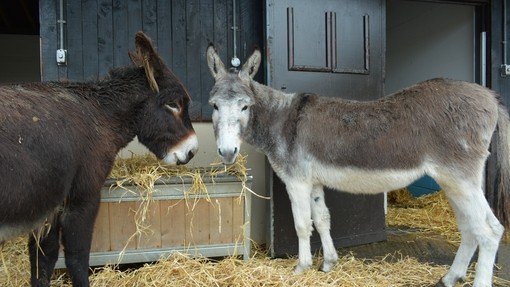Keeping your donkey safe
- Poisoning is more likely to occur when grazing is sparse and your donkeys may be short of food (eg in conditions such as droughts or heavy snow falls or during dieting), they will be more inclined to eat any available foliage
- Bear in mind that donkeys can stretch over fencing to reach plants/trees growing outside the field boundary such as your prize rhododendron or the yew tree they can only just reach. Also leaves, fruits and seeds from remote plants can blow into paddocks. Donkeys are also more likely to break out to gain access to gardens and woodlands where they will find all sorts of plants not normally available to them
- Even when donkeys are turned out to pasture, always ensure they have access to suitable forage. We recommend providing barley straw so that there is always something to eat or a short chop product if your donkeys have poor dentition
- Poor pasture management and overgrazing can lead to the predominance of poisonous plants such as ragwort and bracken
- Some poisonous plants are bitter in the green (fresh) state but become sweeter if dried out (eg if sprayed with weed killer, pulled and left in the field or baled in hay). If you are pulling up plants always remove them from the paddock immediately. Always check each section of hay and remove any dried herbage that is unfamiliar to you
- Thoughtless disposal of garden rubbish, such as hedge trimmings containing yew or privet, etc is the most common cause of sporadic cases of poisoning. Let your well-meaning neighbours know that any garden waste such as hedge clippings or grass cuttings are potentially fatal and should never be put in the paddock
- If you take your donkeys for walks or to events make sure they cannot access poisonous plants. For instance yew is one of the most toxic plants in the UK and is commonly found in church yards, so if your donkeys are attending a Christmas Nativity they may attempt to snatch a bite
- Some trees are quite safe for most of the year but need to be fenced off during the fruiting season. This includes all fruit trees, beech and oak trees
- Never underestimate the ingenuity of donkeys. If they can escape they will and then you have no control over what they may eat. Check your boundaries regularly
Curiosity and boredom are key factors in the eating of unsavoury foliage and plant matter.
Ensure good fencing and the provision of safe boredom breakers such as bramble, gorse or herb patches or cut branches from hazel, ash, hawthorn, apple, limited willow, alder, lime and poplar trees to minimise the risk (see our ‘Safe trees and shrubs’ page).
Prevention is better than cure
Plants can appear and grow quickly so check all boundaries for evidence of poisonous plants weekly and remove immediately.
Always dispose of poisonous plants carefully to prevent donkeys accessing them and seeds being dispersed. Always be on the lookout for poisonous plants when moving strip grazing fences, changing paddocks or poo picking your paddock.
Poisonous plants and trees in the UK
If you suspect your donkey has eaten parts of poisonous plants or trees, or the donkey shows any unusual symptoms, call your vet immediately.
Please note that this list of poisonous plants does not include every poisonous plant found in the UK and Ireland.
- Black Bryony
- Black Nightshade
- Bracken
- Buttercup
- Celandine
- Charlock
- Columbine
- Cowbane
- Deadly Nightshade
- Foxglove
- Ground Ivy
- Hellebore
- Hemlock
- Hemlock Water-Dropwort
- Holly Berries
- Horsetail (Mare’s tail)
- Ivy
- Larkspur
- Lily of the Valley
- Linseed
- Meadow Saffron
- Monkshood
- Potato
- Privet
- Ragwort
- Rhododendron
- St John’s Wort
- Spurge
- Water Hemlock
- White Bryony
- Woody Nightshade
- Black Walnut
- Elder
- Horse Chestnut
- Laburnum
- Laurel
- Laurel Cherry
- Leylandii
- Oak
- Plum
- Peach
- Red Maple
- Sycamore*
- Wild Cherry
- Yew
* Sycamore seeds/seedlings, flowers and leaves are implicated in the development of potentially fatal atypical myopathy, however cut logs (minus leaves/flowers/seeds) are safe to use for enrichment.
Although rarely poisonous, we have included fruit trees because during the autumn when they are full of fruit and nuts, eating an abundance of fruit or nuts can cause digestive upsets in donkeys.
We recommend that the trees should be fenced off to prevent donkeys gorging themselves on fallen fruit/nuts.
It is not recommended to feed or allow donkeys access to stoned fruit trees (cherry, peach, etc) as these fruits and trees may also contain poisonous substances.
Download our full guide with further information and images.
References
The following books and websites are recommended for further information:
- Allison, Keith (2011) A guide to plants poisonous to horses. Revised edition. JA Allen & Co Ltd
- Davidson, Sonia (2001) All about poisonous plants (Allen photographic guide). JA Allen & Co Ltd
- Botanical Society of Britain & Ireland
- First Nature




